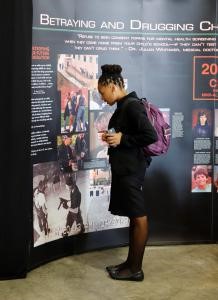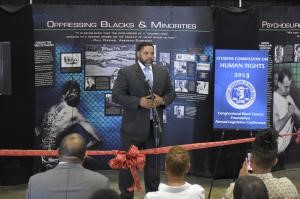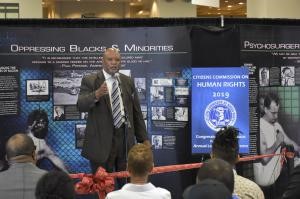The history of “scientific” racism and how it continues is exposed in an exhibit at the Congressional Black Caucus Annual Legislative Conference.
“The use of psychiatry to target and marginalize African Americans, particularly children, has to stop.”
— Fred Shaw, Citizens Commission on Human Rights (CCHR) International
The chances of an African American male being diagnosed with a “serious mental disorder” in a mental hospital is substantially higher than that of a white male, according to recent studies. To talk about these studies and other issues related to the continuing legacy of so-called “scientific” racism, the Citizens Commission on Human Rights (CCHR) is presenting a special exhibit at the Congressional Black Caucus Annual Legislative Conference.

The Psychiatry: An Industry of Death exhibit shows evidence of years of racist practices in the fields of psychiatry and psychology, along with the “rationales” used to justify the discrimination and abuse. Still today, studies show African American children are disproportionately labeled with attention deficit hyperactivity disorder (ADHD), and African American boys are diagnosed at a higher rather than any other student group.
The exhibit also shows that minority children are over-represented in foster care and juvenile detention systems, where they are at greater risk of being prescribed psychiatric drugs. As of 2016, there were 437,465 children in foster care in the U.S., and 23% of them were African American. A recent U.S. Department of Health and Human Services report revealed that behavioral drugs were prescribed to many foster children without any treatment plans or follow-up to check for harmful side effects.

Those touring the exhibit are given information about their rights in the mental health system and urged to talk about this issue in their communities.
The Rev. Fred Shaw, Jr., Director of Public Affairs for CCHR International, was joined by mental health patients’ rights advocate Linda Lagemann, PhD; Bishop Craig Worsham, Senior Pastor of the Agape Church in Los Angeles; and Dr. Joseph Green, Chairman of the Congressional Commission on the 400 Years of African American History, in the ribbon-cutting ceremony for the exhibit. Rev. Shaw called for an end to racism in the field of mental health, saying, “The use of psychiatry to target and marginalize African Americans, particularly children, has to stop.”

Rev. Shaw began working to reform the mental health field over 25 years ago. With the American Psychiatric Association appealing to the US Food and Drug Administration to reclassify the electroshock machine to the same safety category as contact lenses, and with the high amount of drugging of Black America, he felt compelled to do something.
The work of Rev. Shaw, who is also the Vice President of the National Association for the Advancement of Colored People (NAACP) Inglewood/South Bay branch, led to two NAACP resolutions, one to ban ECT and another to oppose the mass psychotropic drugging of children. Both were unanimously passed by the NAACP national office.

As a watchdog organization, CCHR produces millions of educational materials including booklets, white papers, brochures and documentaries in up to 17 languages covering all aspects of psychiatry’s harmful impact on society and the need for reform to protect patients’ civil and human rights and to require informed consent. In addition to its feature-length documentaries, CCHR also produces short educational videos featured on its YouTube channel.
Working with doctors, whistleblowers, parents, consumers and other civil and human rights organizations, CCHR has provided government officials with documentation exposing abuses in the field of mental health and helped achieve legislative reforms that protect consumer & patient rights.
